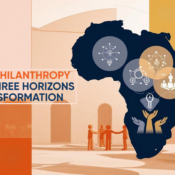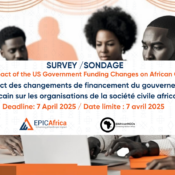Critical Consciousness As A Tool To Decolonise Philanthropy
By Oluwatobiloba Ayodele, Co-Dreamer, Liberation Alliance Africa
Writing from a decolonial feminist perspective, Oluwatobiloba reflects in this article on current practices within the philanthropic sector and the role of critical consciousness in the discourse on decolonial philanthropy.
Global South CSOs continue to call for equitable and decolonial philanthropic practices. For the most part, decolonisation discourse seeks to examine power dynamics among key players, particularly between donors and grantees. It holds space to answer questions such as: Who sets timelines and formats for reporting? Whose agendas dominate donor-grantee engagement? How are funding priorities determined? How are resources distributed? These questions allow us to pay attention to the power dynamics and colonial undertones that shape the development landscape and donor-grantee relationships.
In Reclaiming Agency: Dreaming of a Decolonial Feminist Philanthropy, a 2023 study by Liberation Alliance Africa, CSOs in West Africa highlighted that funders’ expectations often fail to align with the flexible nature of their work as grassroots organisations. This validates what we know about agenda-setting and the imposition of funders’ agendas on CSOs, particularly in the Global South. The consequences of this situation are a dependency culture on Global North aid, the invisibilisation of grantees’ realities, and a loss of autonomy and space to contribute to decision-making processes. This reality continues to put CSOs in a vulnerable state, even as they face dynamic changes within their contexts, exacerbated by actions from government fascists and fundamentalists.
Power dynamics in agenda-setting continue to determine and influence organising and the work CSOs do within their contexts—making it complex to respond to issues in a way that speaks truth to their lived experiences and multiple identities. Where is the Money for Black Feminist Movements?, a 2023 report by The Black Feminist Fund, further validates that funding is frequently siloed by issue or population, making it difficult for organisations to conduct intersectional work across issues, populations, and movements, and to employ a range of strategies to secure funding. This article reflects on current practices within the philanthropic sector and the role of critical consciousness, a concept adapted from Paulo Freire, in the discourse on decolonial philanthropy.
Professor Sylvia Tamale, Ugandan feminist, academic, and human rights activist, explains decolonisation in her book, Decolonisation and Afro-feminism, as the continuous dismantling of deeply rooted colonial structures, ideologies, and practices that influence every aspect of our lives. In the philanthropic context, we ask ourselves: What are the representations of colonial legacies in philanthropy, and how do they continue to shape the development landscape? What are the different initiatives, solutions and changes that will support the reimagination of a people-centred and decolonial philanthropic landscape? While I do not have all the answers in this reflection, I am thinking of critical consciousness as a useful framework for analysis and discourse. Evidence shows that current philanthropic practices cannot sufficiently create space for the co-creation of agenda-setting and power shifts needed for participatory grantmaking. These realities continue to shape the discourse on decolonial philanthropy and contribute to the theorisation of what we mean by delinking from colonial matrices of power.
To understand power, we must come to a place of self-awareness. We must see the self as the first site for liberation. Our lives must be living examples of our politics. Self-transformation is needed for decolonial philanthropy and a shift in power. Funders cannot publicly claim participatory grantmaking if their funding priorities are still largely determined by people who are far removed in experience and knowledge from the issues they intend to fund. Trust-based philanthropy must also include core, flexible, unrestricted and long-term funding of local community organising, young, queer and grassroots movements in the Global South. The existing misalignment of politics and actions underlines prevailing power imbalances and the continued presence of colonial relics within the development space. Actions directed to shift power must reflect the politics of liberation.
Paulo Freire describes critical consciousness as the ability to understand and recognise ‘what is (his emphasis) in order to change it. Critical consciousness in the philanthropic context offers a transformative shift in power and agenda-setting. It is a deliberate process of continuous awakening—an awareness that transcends tokenistic intentions, faux participatory grantmaking, and other variations. At the interpersonal level (in donor-grantee relationships), critical consciousness serves as a tool for liberation. Freire’s critical consciousness framework can be adapted at this level if donors will:
- Acknowledge that, as donors, you hold significant power by being the provider of money and resources.
- Understand the dynamics that maintain this power and how it impacts the donor-grantee relationship.
Cultivating this level of awareness can foster more equitable and transformative relationships with grantees, ultimately contributing to decolonised philanthropy efforts. Critical consciousness is not just an intellectual exercise but a call to action—a commitment to continuous reflection and change that can dismantle entrenched colonial and power structures.
One of the goals that informs what we do at Liberation Alliance Africa is to challenge historical oppression using critical consciousness. From our engagements in West Africa and conversations on disrupting colonial legacies of philanthropy in Africa, there is a growing awareness and presence of community engagement that actively develops strategies and advocates for structural reforms within the philanthropic landscape. We will continue to contribute to decolonial philanthropy efforts using our consciousness-raising offerings to shift power and transform interpersonal relationships within the philanthropic space.
Works consulted
Black Feminist Fund. (2023). Where is the Money for Black Feminist Movements? Retrieved from.
Freire, P. (1974). Education for Critical Consciousness. New York: Continuum.
Liberation Alliance Africa. (2023). Reclaiming Agency: Dreaming of a Decolonial Feminist Philanthropy. Retrieved from.
Tamale, S. (2020). Decolonization and Afro-Feminism. Ottawa: Daraja Press.
About Oluwatobiloba
Oluwatobiloba Ayodele is a Nigerian feminist writing to inspire feminist realities. Her career is dedicated to supporting social justice advocacy and movements by ensuring they have the resources and visibility needed to advance systemic change. Oluwatobiloba writes from a decolonial perspective. She has previously worked with Vision Spring Initiatives and Akina Mama wa Afrika–the pan-African feminist leadership organisation. She is the co-dreamer of Liberation Alliance Africa and an Associate Consultant with the Prevention Collaborative.



